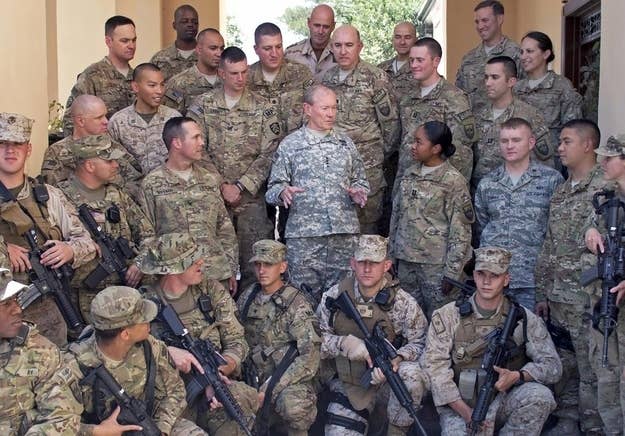
The draft version of the Republican Party's platform, hashed out in Tampa this week, does not mention the military's ban on out gay service known as "Don't Ask, Don't Tell" that was repealed on President Obama's watch. What it does, however, is talk around it in terms that those who fought for repeal say, at best, represent a desire to "revisit" the topic in a Romney administration.
Language about the "incompatibility of homosexuality with military service" from the 2008 platform is gone, a change pointed to as an improvement from 2008 and an tacit acknowledgment that the past year of out military service had no major problems.
Some of the language in the 2012 draft that remains, however, includes language that is jarring to LGBT advocates — and touted as a success by repeal opponent Elaine Donnelly of the Center for Military Readiness.
The platform draft states that the Republicans "reject the use of the military as a platform for social experimentation" and later note that they support "an objective and open-minded review of the current Administration's management of military personnel policies and will correct problems with appropriate administrative, legal or legislative action."
In a statement, Donnelly said, "It will be important for the next Commander-in-Chief to give permission to all personnel — especially close combat troops whose views were ignored by the Obama Administration — to candidly report on the true consequences of imposing LGBT law and related policies on our military."
The language comes in a section of the platform titled, "Supporting Our Troops, Standing By Our Heroes," that leads off by stating, "The members of our military should be treated with the utmost respect and dignity," according to a version of the draft platform mistakenly posted online by the Republican National Committee and obtained by Politico.
Aubrey Sarvis, the outgoing head of SLDN, told BuzzFeed, "Our nation's senior military leaders, Congress, and the American people have spoken on the repeal of 'Don't Ask, Don't Tell' and moved on. Maybe in time the GOP platform committee will come around too, rather than suggesting the repeal policy may be revisited by a Romney administration."
Later in the "Supporting Our Troops" section of the platform draft, in the same paragraph that the platform states that "military suicides [are] running at the rate of one a day," for example, the party affirms that it "will enforce and defend in court the Defense of Marriage Act (DOMA) in the Armed Forces as well as in the civilian world."
Under DOMA, which defines "marriage" and "spouse" in all federal laws as referring only to marriages between one man and one woman, and a couple of statutes relating to veterans' benefits, gay, lesbian and bisexual servicemembers married legally under state law to a person of the same sex cannot obtain equal benefits.
Josh Seefried — the head of OutServe, a group formed to represent LGBT servicemembers — took aim at what he sees as the incongruence between supporting troops and excluding those with same-sex spouses for equal treatment.
"It's especially offensive because we had a suicide within our membership this week," Seefried told BuzzFeed. "It's absolutely disgusting that they're trying to politicize our military and that we're getting pulled into it like this."
Seefried focused on the additional difficulties that servicemembers with a same-sex spouse face because of DOMA. For instance, he said, "They can't do joint spouse assignments. ... They have to choose between the military and being with their family. It's the same sort of scenario as [it was] under 'Don't Ask, Don't Tell.'"
In two federal lawsuits — one in Massachusetts and the other in California — those laws have been challenged by the Servicemembers Legal Defense Network — which is in the process of merging with OutServe — and the Southern Poverty Law Center, respectively. The Obama administration, as in other DOMA challenges, agrees with the plaintiffs that the laws are unconstitutional. Also as in other challenges, the House Republican leadership is defending the laws.
The SLDN challenge is on hold currently, pending the outcome in another DOMA challenge, unrelated to the military, that already was decided by the First Circuit Court of Appeals, which hears appeals of federal cases in Massachusetts. The SPLC case, however, is moving forward, despite a request by the House Republican leaders to put that case on hold.
Finally, the platform language also addresses what has become a regularly raised issue since the end of the military's ban on out gay service — military chaplains — saying that "a Republican Commander in Chief will protect religious independence of military chaplains and people of faith." It then states that the party "supports rights of conscience and religious freedom" for chaplains and others in the military.
The platform was approved this week in Tampa by the platform committee, although the delegates' final approval remains.
A Very Full Paragraph In The GOP Platform Draft

